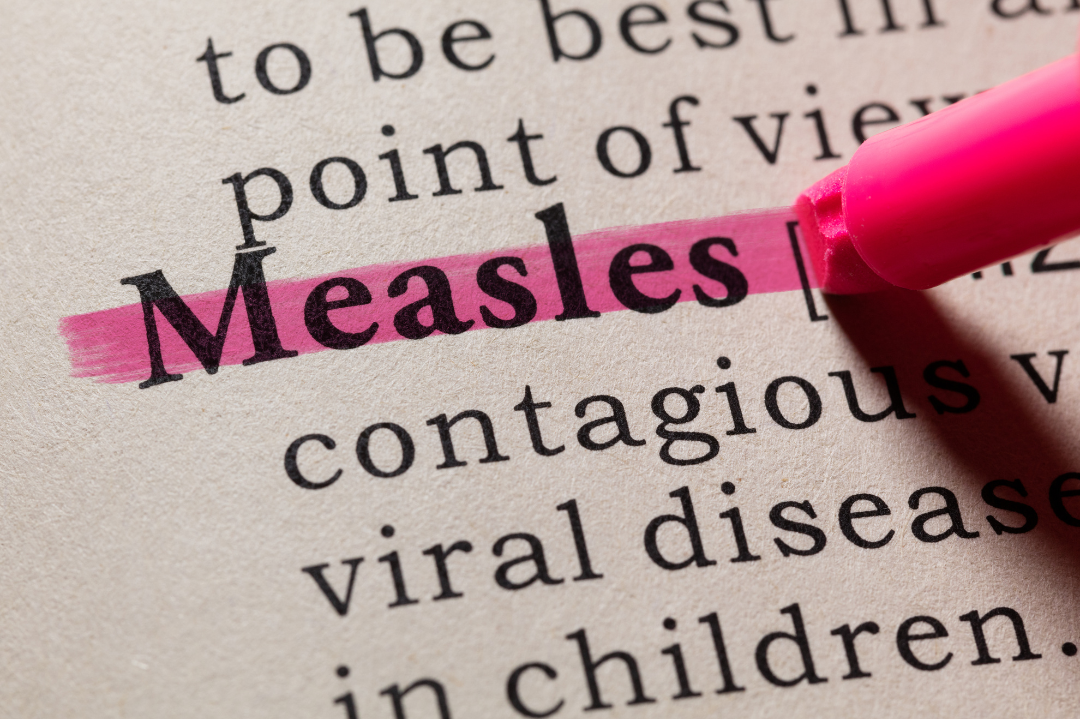
Measles cases have been on the rise in the United States. As of May 15, 2025, there have been over 1000 cases of measles reported in the United States, according to the CDC. The Virginia Department of Health has recently reported Virgnia’s first case of measles this year, in a 3 year old child that had traveled internationally. The best way to prevent measles is by ensuring that you have had 2 doses of the measles, mumps, and rubella vaccine, most commonly referred to as the MMR vaccine. If you know you need an MMR vaccine, click here to schedule an appointment.
Measles is a highly contagious disease that affects the respiratory system. In more severe cases, the body’s ability to fight other infections may be reduced. The measles virus is spread by coughing or sneezing into the air. The disease can be caught by breathing in the virus or by touching contaminated surfaces and then touching your eyes, mouth, or nose. If you intend to travel, you should be fully vaccinated against measles at least 2 weeks before leaving. A single dose provides 93% protection, but two doses provide 97% protection. For infants under 12 months old who are traveling, it is recommended that they receive an early dose at 6-11 months (MMR vaccine is not recommended for infants younger than 6 months old), another dose at 12-15 months, and then a final dose at 4-6 years old. For children over 12 months old, adolescents, and adults who are traveling, they should get the first dose immediately and the second dose 28 days after the first dose. There are some groups of people who are considered to have immunity against measles and do not have to receive the vaccine before traveling. This includes:
- Written documentation of adequate vaccination
- Laboratory evidence of immunity
- Laboratory confirmation of measles
- Born in the US before 1957
After traveling internationally, it is important to monitor your health for 3 weeks due to the highly contagious nature of this disease. Be sure to contact your doctor immediately if you get sick with a rash and fever after traveling internationally.
Even if you are not traveling internationally, it is still important to get vaccinated against measles. The groups of people who should get vaccinated include: children, adults with no evidence of immunity, college students, healthcare workers, international travelers, women of childbearing age before they get pregnant, and groups at increased risk for mumps because of a mumps outbreak. The normal MMR vaccine schedule is as follows:
- Children need 2 doses of MMR vaccines:
- 12-15 months: 1st dose
- 4-6 years: 2nd dose
- Older children, adolescents, and adults:
- need 1 or 2 doses of MMR vaccine if they do not have evidence of immunity
- doses should be separated by 28 days
There are also groups of people who should not receive the vaccine and these include: people who have had an allergic reaction after a previous dose of MMR vaccine, people that are or may be pregnant (should wait to get vaccine until after they are no longer pregnant and avoid getting pregnant for at least 1 month after receiving vaccine), those who have a weakened immune system due to disease or medical treatments or have a family member with a history of immune system problems, those with conditions that make them bruise/bleed easily, anyone who has recently had a blood transfusion, people with tuberculosis, anyone feeling unwell or severely ill, or anyone who has gotten any other live vaccines in the past 4 weeks. There is also a group of people who received an ineffective measles vaccine between 1963 to 1967. It is recommended that anyone who received an inactive vaccine should be re-vaccinated. If you are uncertain about whether or not you received the vaccine, it is recommended that you receive a booster dose of the MMR vaccine. A person infected with measles can pass it to others as soon as four days before a rash appears and as late as four days after a rash appears. If you are exposed to measles, you should quarantine for 21 days after exposure. If you test positive for the measles virus, you should isolate until 4 days after the rash clears. Measles symptoms can include:
- 7-14 days, & up to 21 days after a measles infection:
- high fever
- cough
- runny nose
- red, watery eyes
- 3-5 days after symptoms begin, a rash occurs:
- the rash begins as flat, red spots on the hairline and spreads downward, reaching the neck, arms, legs, etc.
- small, raised bumps may also appear on the flat, red spots
- when rash appears, fever may spike to > 104°F
Some serious complications of measles may include:
- hospitalization
- pneumonia
- miscarriage
- preterm birth
- brain swelling
- death
Measles is an easily preventable disease and it is important to protect yourself by taking the action to get vaccinated. If you know you need an MMR vaccine, click here to schedule an appointment.
Source(s):
https://www.cdc.gov/measles/data-research/index.html
https://www.piedmontpediatrics.net/recent-measles-outbreak-february-2025


